Wstęp (Barbara Wolska)
Next issue of our yearbook is devoted to the idea of self-limitation and accompanying practices that play a key role in culture.
The idea of restraint, renunciation, self-control (above all, emotions and drives) as a condition for a dignified and happy life is a universal concept, known since ancient times and functioning e.g. in the Far East (Confucianism, Buddhism). Ascetic practices are associated primarily with Christianity, but self-restraint has for centuries returned in various cultural texts not only as a condition for the mystical experience of the individual, but also a guarantee of social harmony and well-being. Resignation and loss are concepts that are generally negatively evaluated, in terms of “lack” – the 21st series of “Inscription” gathers works that show different and ambiguous aspects of these experiences.
Collected texts focus on the subject of the choice reflected primarily in Polish literature – from artistic choices (praise of the simplicity of style in Mikołaj Rej’s writings), difficult ethical choices of the protagonists of nineteenth-century novels (voluntary self-limitation in favor of the group, respect for others’ individuality, the necessity to give up some values to achieve other goals), through the issue of existential decisions of the authors themselves and conscious shaping of their own creative path, up to the issues of choices imposed by censorship in PRL times (self-censorship and acceptance by the creators of the imposed restrictions and their impact on the shape of literary works – section “Passions and editorial and text confrontations”).
A part of the chapter “Dissertations and materials” entitled “Prus not-lost” contains articles that are presentations from the conference in Nałęczów in May 2012 (organized on the centenary of the writer’s death), focusing on the problem of the value and price of life choices of the heroes of the writers’ roman The Doll, as well as the motive of a specific economy in interpersonal relations. The link between these two blocks of text is the issue of conscious self-limitation, characteristic of the culture and literature of positivism.
In the “Varia” section there is an attempt to visually capture this issue – the work of students of the Academy of Fine Arts in Warsaw, devoted to the difficult art of losing and resignation.
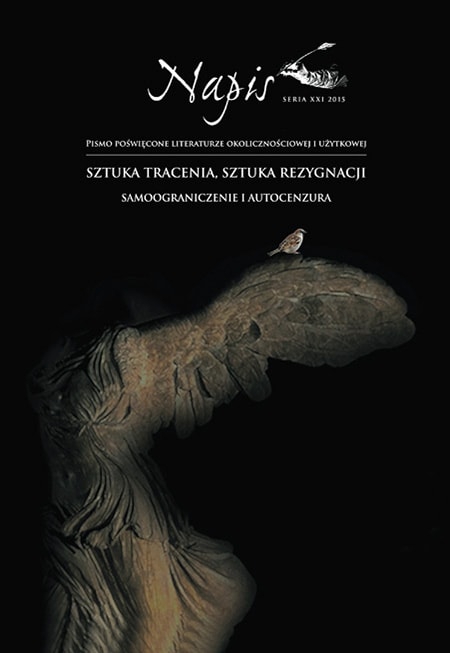
Wstęp (Barbara Wolska)
Wojciech RYCZEK
Zafarbowane słówka krasomędrków. Mikołaj Rej o sztuce barwienia słów
Artykuł (PDF) Show abstract Hide abstract
The main purpose of the paper is to discuss Mikołaj Rej’s critic of rhetoric reduced to the art of embellishing words in his famous parenetical work The Image of a Good Man’s Life (Krakow 1567-68). Using the metaphor “the tinged words”, Renaissance author revoked well-known figure “colors of rhetoric” (colores rhetorici) in the context of contemporary sophists who were masters in multiplication of linguistic ornaments. For Rej, the simplicity of language (correlated in the light of the Good News with a Christian life) was the main condition of truth and truthfulness. Thus, the major rule of his rhetoric might be epitomized in two Latin words: sola veritas (‘only truth’).
Agnieszka SZCZECHURA (HUMENIUK)
Zygmunt Kaczkowski wobec tradycji sarmackiej w kontekście cyklu nieczujowskiego
Artykuł (PDF) Show abstract Hide abstract
The aim of the article is to describe the attitudes of Zygmunt Kaczkowski in the context of the Sarmatian tradition. When analysing the writer’s attitude to Sarmatism on the basis of the texts which belong to the Nieczuja cycle, it has been noticed that the writer “lost” the mythical imagination about the past for the sake of the objective description.
Agata KŁOSEK
Za cenę śmierci. Sztuka tracenia i rezygnacji w utworach Zygmunta Szczęsnego Felińskiego
Artykuł (PDF) Show abstract Hide abstract
Zygmunt Szczęsny Feliński in his works Prakseda [Prakseda] and Oskar i Wanda [Oscar and Wanda] talks about the problem of loss which is at the same time resignation. The protagonists accept misfortunes that befall on them, treating these misfortunes as necessity to reach higher goals such as spiritual maternity. The author took this attitude to loss from Christian philosophy – it is closely related to Divine Providence which creates the fate of the world without intervening with the human’s free will.
Magdalena RUDKOWSKA
Pająk. O wyobraźni twórczej Józefa Ignacego Kraszewskiego (wstęp do rozważań)
Artykuł (PDF) Show abstract Hide abstract
The basis for this essay is the reconstruction of meaning of the spider’s metaphorical image. The spider in the 19th century has become a word-signal evoking the melancholic worldview. The early works of Józef Ignacy Kraszewski are interpreted here as a testimony to his fascination focused on German fantastic literature (including the prose of E.T.A. Hoffman), in which this motif is also employed. The suggested interpretation of the lesser known works of An Ancient Tale’s author is an attempt at reconstructing the creative imagination of Kraszewski, in which the image of a spider in a web, as a symbol of a person drawing from within, are associated with the comfort the writer finds in the creative process while constantly struggling with the sorrow for the past and the feeling of loss.
Marta SOJA
Sztuka rezygnacji. Studium „Czciciela potęgi” Elizy Orzeszkowej
Artykuł (PDF) Show abstract Hide abstract
The subject of the analysis in the article are various types of resignation described by Eliza Orzeszkowa in her late historical novel Czciciel potęgi [The worshipper of power] (1889) which has been barely researched. The examples of the protagonists’ existential situations and intellectually-moral choices show causes and effects (moral, practical, economic) of decisions about drifting away from the original outlook on life, dreams and beliefs. The literary text is compared to Orzeszkowa’s opinions on resignation found in her epistolary legacy.
Agnieszka BĄBEL
Kłopoty z Deotymą
Artykuł (PDF) Show abstract Hide abstract
The article presents contradictory opinions about Jadwiga Łuszczewska (Deotyma) and her artistic works expressed by her contemporaries and future generations. These opinions are contrasted with the image of the poet that emerges from her Pamiętniki 1834-1897 [Memoir 1834-1897]. Selected critical comments are set in the cultural context of the time (for example the phenomenon of poetical improvisation and a literary salon) and also set against certain biographical information. An attempt has been made to indicate possible reasons for enormous fascination, intense dislike or treatment with condescension that Deotyma herself and her controversial life choices arouse.
Tadeusz BUDREWICZ
Myśliwi i naganiacze. Stratyfikacja ról społecznych na pograniczu
Artykuł (PDF) Show abstract Hide abstract
The topic of the article is the image of social roles in the hunter’s subculture. The analysed material was chosen from hunter’s memoirs and stories of the 19th and 20th centuries as well as periodicals (“Łowiec” [hunter], “Łowiec Polski” [Polish hunter], “Myśliwy” [hunter]). The hunter’s literature has a great informative and documentary potential, and therefore it can serve as a basis of social and cultural conclusions.
The hunter’s culture is closed, conservative, patriarchal and elitist – it excludes women and representatives of lower social groups in the social hierarchy. It contains relics of feudal epoch (the pictures of preparations for the hunts and the hunts themselves) as well as many elements strongly connected with military rituals (the canon of hunters’ activities, the hunting language which is a hybrid of military jargon and a code understandable only to insiders). The participants of the hunts create two groups with a strong sociological and cultural demarcation: people from lower class are trackers, beaters and porters, whereas people from upper class have a privileged position as those who stand face to face with an enemy and fight with it to the death.
The second part discusses the hunt in the borderland of weather conditions and in the borderland of countries and regions. The hunter in the borderland is a stranger from the outside who clings on to the representatives of the indigenous inhabitants, who live in the place for generations, for support and help. The local culture serves as a metaphor for home, mother and wife, that is for remaining in one place. The hunter in the borderland is a nomad and a traveller, who yields to the attractiveness of the local culture which becomes for him a place of final destination – home.
Bartłomiej SZLESZYŃSKI
O zagubieniu, utracie i pornograficznym końcu XIX wieku w „Zagubionych dziewczętach”
Artykuł (PDF) Show abstract Hide abstract
The article analyses a comic book by Alan Moore and Melinda Gebbie in the context of numerous interviews given by the British author which relate to this book and also to the issues such as: comic book culture, Victorian culture, sexuality and its representations in various periods. Moore and Gebbie’s work is analysed mostly in three facets:
1. various forms of stories about loss and the state of losing depicted in the book (and signalised by one of the meanings of the title Lost Girls), and also about the narration of an attempt at self-recovery;
2. intertextual and graphic reference to the second half of the 19th century (related to literature, fine arts, and cultural phenomena);
3. the manner in which the comic book refers to pornography and meaning that Alan Moore ascribes to the term “pornography”.
All these facets combine into a narration about the ending of the 19th century, when the I World War becomes the moment of the loss of Imagination and of the transfer of culture under the power of Thanatos.
Wacław FORAJTER
Rozpustny Wokulski – problemów ciąg dalszy
Artykuł (PDF) Show abstract Hide abstract
The article entitled Rakish Wokulski – the ongoing problems takes up the problem of the meaning of erotic motifs in The Doll by Bolesław Prus, most of all – their links to the contemporary theories of neurosis. Unlike the existing studies of the problem that draw from neo-freudian theories, the article uses mostly classic Sigmund Freud’s concepts especially “psychic impotence” and “debasement in the sphere of love”. From this perspective The Doll’s protagonists, especially Wokulski, seem to fall ill into a neurosis as a result of supressing instincts.
Ryszard KOZIOŁEK
Ekonomia polityczna lalek
Artykuł (PDF) Show abstract Hide abstract
The article uses the concept of Marx’s commodity fetishism to uncover and describe complex relations between eroticism, political economy and psychology in The Doll [Doll] by Bolesław Prus. The scene under analysis is when Wokulski fires from his shop a shop assistant who was overfamiliar with Izabela Łęcka. The interpretation applying the given contexts unveils political dimension of economy which Wokulski uses to overcome class barriers and also to create new boundaries which are supposed to separate the object of his love from other men.
Paweł TOMCZOK
Dyskurs monetarny w „Lalce” Bolesława Prusa
Artykuł (PDF) Show abstract Hide abstract
The article is an analysis of economic discourse in The Doll by Bolesław Prus. The motifs related to money in The Doll were described by Józef Bachórz in the articles collected in the book Spotkania z “Lalką” [Meetings with The Doll] (Gdańsk 2010). This valuable analysis can be complemented by a study of protagonists’ economic activities as a whole in the context of practices defined by capitalist economic discourse.
Prus suggested the interpretation of his novel as an image of social disintegration. The research of economic discourse allows to complement the biological understanding of the disintegration as the disintegration of the world – which is the interpretation presenting society in the times of a “great change” where main drive is money. The Doll in the perspective of research on monetary discourse appears to be not only the image of social degradation, the disintegration of an old reality both feudal and romantic, but also a great reflection on the borders of the influence of money in the times when it seems that one can buy everything for money.
Ewa PACZOSKA
Amerykanin i Polak w Paryżu (Henry James – Bolesław Prus)
Artykuł (PDF) Show abstract Hide abstract
The article proposes a comparative reading of two novels: American of Henry James and The Doll of Bolesław Prus. The author argues that James’ novel published in Polish in 1878 could become an inspiration for Prus. The circle of problems of American and The Doll is focused around similar themes: the identity of a modern man and the patterns of masculinity and femininity. Both novelists show a mechanism of creation for idealistic fantasies.
Agata GRABOWSKA-KUNICZUK, Marta PARNOWSKA
Bolesława Prusa „zabawa” w pisanie na maszynie – narzędzie, autor, tekst
Artykuł (PDF) Show abstract Hide abstract
The text presents Bolesław Prus’ first exercises in writing on a typewriter, depicting an experienced writer at the very moment of substantial changes in his workshop when he shifts from a manuscript to a typescript. One of his first typescripts catalogued as Nauka Bolesława Prusa pisania na maszynie [Bolesław Prus practice in typewriting] (manuscript BPW 128 IV compared with the first edition) is a valuable testimony of writer’s thoughts on the introduction of facts (in Kroniki [Chronicles]) and the creation of texts in general (composition rules), and also serves as a record of the nineteenth century everyday life (biographical information about the writer). These exercises are also an interesting example of a meta-text in which the author recorded and commented on his numerous errors, mistakes and corrections while becoming familiar with the new tool.
The article is an attempt to analyse the role of the typewriter in writer’s life in the context of the historic evolution of the typewriter itself (on the basis of memoirs from the period and other sources dealing with the history of typewriters in Poland in the 19th century and at the turn of 19th and 20th centuries).
Prus’ first typescript is published separately with editorial comments.
Bolesław Prus, [Nauka Prusa pisania na maszynie] (oprac. Agata Grabowska-Kuniczuk)
Małgorzata PAWLATA
„Moeris” Marcina Eysymonta – panegiryczna sielanka na cześć Stanisława Augusta
Artykuł (PDF) Show abstract Hide abstract
Moeris. Eclogue in other words pastoral pride, : education and rest of youth extols in front of His Royal Highness Stanisław August, the King of Poland, The Grand Duke of Lithuania, and in rural rhymes a Polyarchy, this is one of three idylls by Marcin Eysymont which were offered to Stanisław August. They were published in “Zabawy Przyjemne i Pożyteczne” [Pleasant and useful games] between 1774-1776.
The work is a praise of king’s activities, who was stressing the need of youth’s education and upbringing in the spirit of good citizenship. At that time it was a very important but also a very difficult issue on account of the political situation after the first partition of the country. It is the context that is very important to interpret Moeris – the prototype, Virgil’s ninth eclogue from where the name of the main protagonist was taken and the theme – sorrow after the loss of land, depicted with the use of pastoral topoi.
Marcin Eysymont, Moeris. Ekloga… (oprac. Małgorzata Pawlata)
Aleksandra BŁASIŃSKA (KASICA)
„Wygórowany idealizm” czy „handel księgarski”? Dialog korespondencyjny Zofii Trzeszczkowskiej i Stanisława Marka Rzętkowskiego o publikacji przekładu „Luzjad”
Artykuł (PDF) Show abstract Hide abstract
The article presents the dialogue between Zofia Trzeszczkowska (who wrote under a pseudonym of Adam M-ski) and Stanisław Marek Rzętkowski, the literary director of Warsaw’s magazine “Życie” [Life].
The letters discuss Trzeszczkowska’s translation of Luzjady [The Lusiads], a Portuguese epic poem by Luís Vaz de Camões. It was commissioned by Zenon Przesmycki in 1887 and was to be published in Życie’s literary supplement. However, when Rzętkowski had taken over as editor, the commissioned translation was not accepted. The letters present Rzętkowski’s negative stand on the translated work (the letter dated on 3 August 1889) and the translator’s reaction to the rejection of her work (dateless letter). This full of emotions correspondence presents the atmosphere between the members of „Życie”’s editorial board and also gives a wider view of the situation when Przesmycki resigned from his position and Rzętkowski took over.
The manuscripts of the letters are collected in the National Library, the catalogue number assigned: 2864 (k. 89-94). They are a part of Zenon Przesmycki’s correspondence.
[List Stanisława Marka Rzętkowskiego do Adama M-skiego i respons] (oprac. Aleksandra Błasińska (Kasica))
Kamila BUDROWSKA
Trzy cenzorskie recenzje tomu „Wszystko jest obok” Ireneusza Iredyńskiego
Artykuł (PDF) Show abstract Hide abstract
The study presents unknown archives of the GUKPPiW [The Main Office of Control of Press, Publications and Shows]. The source materials indicate that when reading Ireneusz Iredyński’s first volume of verse in 1958, the censors formulated a multitude of unfavourable opinions not only about the given text but also about “young” poetry in general. The artistic routes of the most outstanding post-war poetry generation, the so-called pokolenie “Współczesności”, developed under the hostile attitude of the censorship office.
Kajetan MOJSAK
W labiryncie. Cenzorskie recenzje „Pamiętnika znalezionego w wannie” Stanisława Lema
Artykuł (PDF) Show abstract Hide abstract
The article presents censorship reviews of Memoirs Found in a Bathtub by Stanisław Lem written in censorship offices in Cracow and Warsaw. As a result of the reservations expressed by censors, the author added a new preface to the novel which was accepted for the publication of the book without further interference. Numerous censorship documents dealing only with one novel clarify the circumstances of writing the foreword and also provide some insight to the censors’ way of thinking, illustrate the most important control mechanisms and present formal evaluation criteria – both politically-ideological and aesthetic.
The censors evaluating Lem’s novel do not intend to go through the interpretative labyrinth of Memoirs…; they insist on author’s unambiguous comments which would allow to neutralise political vagueness by the “appropriate” orientation of the novel. When accepting the new preface they seem to omit (yet it is not certain to what extant the omission is deliberate) the fact that the added foreword is another layer of the novel’s fiction and is not a meta-comment which could be considered as the voice of the author.
Hanna ŻBIKOWSKA
Antoni Lange – poeta metafizyczny XIX stulecia. Barokowe konteksty „Rozmyślań”
Artykuł (PDF) Show abstract Hide abstract
The article is devoted to the relationship between Rozmyślania [Musings] by Antoni Lange and the baroque poetics, with special focus on the sixteenth and seventeenth century metaphysical poetry. The starting point is the stylistic perspective – Lange’s cycle was interpreted as the nineteenth century creative implementation of metaphysical style elements, formed in the Baroque. The fragments of Rozmyślania [Musings] are compared to the poetry of Mikołaj Sęp Szarzyński, Daniel Naborowski, Sebastian Grabowiecki and Jan Andrzej Morsztyn. The perspective of the Polish Baroque was extended to the European context, most of all to the English metaphysical poetry. The significant issues are Lange’s conceptismo and his attitude towards art as a value.
Elżbieta A. JURKOWSKA
Radomskie obchody jubileuszu Jana Kochanowskiego, czyli o zarządzaniu tradycją
Artykuł (PDF) Show abstract Hide abstract
The article is about the celebration of Jan Kochanowski’s anniversary (450 anniversary of his birth and 400 of his death) in the eighties of the 20th century. On the basis of the gathered material (materials maintained in Archiwa Państwowe [State Archives] in Radom in Komitet Wojewódzki PZPR Wydział Propagandy [the Voivodship Committee of the United Polish Workers Party, the Department of Propaganda]) it has been presented how the preparations to the celebration proceeded, how the social recognition was built on the oeuvre of the Renaissance poet, and also on how the memory and national heritage were managed. The analysis shows that anniversary celebrations in 1980-1984 were mostly instrumental, vulgar and drawn by the propaganda machine.
Bartłomiej SZLESZYŃSKI, Agnieszka KOCHAŃSKA, Konrad NICIŃSKI
Jak przekazywać naukową wiedzę w Internecie. (Na marginesach kolekcji „PrusPlus” w Nowej Panoramie Literatury Polskiej)
Artykuł (PDF) Show abstract Hide abstract
Nowa Panorama Literatury Polskiej (The New Panorama of Polish Literature, NPLP.PL) is a platform for the presentation of research results in the digital environment. It is a part of the Digital Humanities Centre at the Institute of Literary Research of the Polish Academy of Sciences. It consists of separate collections, each telling a different “scientific story” and using a different form to present content. The interdisciplinary team of the New Panorama of Polish Literature, includes literary and culture researchers, graphic designers and typographers.
Katarzyna STANNY
O sztuce rezygnacji w Sztuce
Artykuł (PDF) Show abstract Hide abstract
In the article About the art of resignation in Art I try to bring closer the figure of an artist entangled in limitations encountered when working on projects that are a result of creative inspirations and I also try to answer a question about a work of art in the full sense of the word. Is the artist who is a freelancer really a free man? Does a completed work exist? If yes, then what or who decides about it?
The Venus de Milo or the Winged Victory of Samothrace are the best examples of classics which by a twist of fate became mutilated in the most beautiful way, because destruction enhanced artistic expression. Picasso by dropping realism lead to cubist revolution which is of great significance for modern history of art. In Poland Henryk Tomaszewski, with a simple and economical form of posters and intellectual “getting to the graphic point”, established a phenomenon of a worldwide reach i.e. the Polish Poster School.
When writing about resignation and self-limitation in art, it is worth mentioning censorship and its influence on the development of artists and asceticism as a creative omission of forbidden but not always paradise fruits.
Sztuka tracenia, sztuka rezygnacji. Prace studentów ASP w Warszawie
Komentarze autorów do fotografii
Agata ROĆKO, Kontusz i frak. O symbolice stroju w XVIII-wiecznej literaturze polskiej, Warszawa 2015 (Dobrosława Wężowicz-Ziółkowska, Mody oświeconych opanowane)
Grzegorz ZAJĄC, Czuły weredyk. Twórczość poetycka Juliana Ursyna Niemcewicza, Kraków 2015 (Barbara Wolska, Julian Ursyn Niemcewicz jako poeta)
Aldona CHOLEWIANKA-KRUSZYŃSKA, Daniel RENISZEWSKI, Biblioteka Julińska. Dzieje łowiecko-leśnego księgozbioru Potockich z Łańcuta, Łańcut 2015 (Wojciech Kaliszewski, Dzieje niezwykłej biblioteki)
Agnieszka BĄBEL, Skandal, gafa, prowokacja. Obraz normy obyczajowej i jej naruszania w polskiej powieści drugiej połowy XIX wieku, Warszawa 2014 (Bogdan Mazan, Naruszenie obyczaju jako życiowy spektakl)
Jolanta SZTACHELSKA, Zabijanie klasyków, Warszawa 2015 (Grażyna Borkowska, Wiedza i wiara)
Kariera pisarza w PRL-u, pod red. M. Budnik, K. Budrowskiej, E. Dąbrowicz i K. Kościewicz, Warszawa 2014 (Wiktor Gardocki, Kariera, pojęcie wieloznaczne)
Noty o autorach artykułów


Stanisław Klucznik
Nieznana osoba zrezygnowała z kreowania dzieła sztuki na tym płótnie i mogłoby się wydawać, że na nim już nic nie powstanie, jednak czas zostawił swój ślad, tworząc nową sztukę – rezygnacji.

Mateusz Kajma
Bez komentarza.
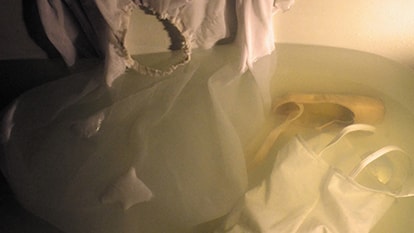
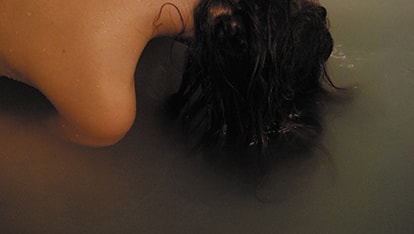
Anna Kraszewska
Zdjęcia przedstawiają rezygnację i „utopienie marzeń”. Rozpływające się marzenia, które mogły się spełnić, gdyby nie czynniki zewnętrzne. Z drugiej strony woda, która powoduje, że jesteśmy tak bezwładni, jak ten kostium i spódnica. Życie jest płynne i potrafi bardzo szybko zmienić nasz sposób i kierunek myślenia. Marzenie bywa okupione bólem i cierpieniem, ale wszystko dla piękna i pasji.
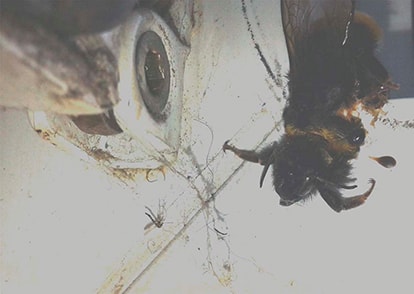
Weronika Majewska
Bez komentarza.
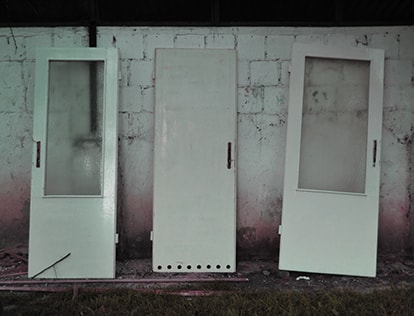
Martyna Mazur
Drzwi bez zawartości, drzwi oderwane od pierwotnej funkcji, „pustostan drzwi”, a jednocześnie sylwetka mężczyzny, który zaakceptował taką sytuację. Stał niewzruszony. Jedynie nie pozwolił się sfotografować. Nie ingerowałam w zastaną „scenografię”. Taka atrapa rzeczywistości. Taka interpretacja.


Anna Bartosiewicz
Przedmiot, z którego musimy zrezygnować dobrowolnie w imię czegoś ważniejszego, jest okryty materiałem, a więc przestaje być przez nas używany, ale wciąż wisi w niezwykle ważnym miejscu.
Na drugim zdjęciu pozostawiłam sam kolczyk, który z kolei przez brak ostrości traci swoje znaczenie i staje się czymś obcym, zdystansowanym, ale cennym dla nas, co możemy osiągnąć, jeśli potrafimy zrezygnować z pewnych rzeczy – i tę rezygnację pokazuje symboliczna pustka na zdjęciu.

Katarzyna Boniecka
Stara szpitalna opaska noworodka symbolizuje upływający czas. Wiąże się z tym stopniowa rezygnacja z pragnienia zatrzymania dziecka tylko przy rodzicu i pozwolenie mu na usamodzielnienie się.


Magdalena Wieczorek
Bez komentarza.

Karolina Ptasznik
Bez komentarza.
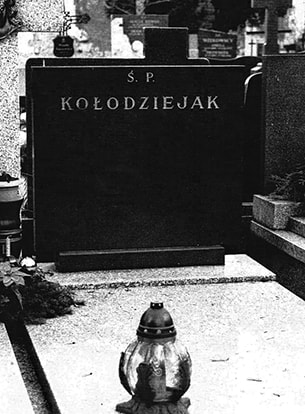
Gabriela Sołowiej
Bez komentarza.

Gabriela Kozińska
Bez komentarza.
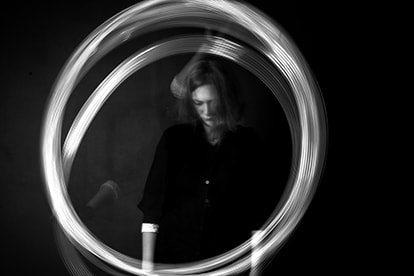
Magdalena Szczęśniak
Za pomocą długiej ekspozycji chciałam przedstawić problem ukazany w temacie. Światło przybiera kształt prostokątnej formy, podobnie jak kadr zdjęcia, w której „zamknięta” jest postać. Zależało mi, żeby zilustrować zagadnienie ogólnie, jako zjawisko, w możliwie najprostszy i minimalistyczny sposób. Zdjęcie zrealizowano przy pomocy jednego narzędzia – latarki. Skala kolorów została ograniczona do skali szarości. Zabieg ograniczenia środków formalnych zastosowano celowo, aby sedno tematu, jakim jest samoograniczenie, było jak najbardziej czytelne. Zjawisko to nie zawsze jest oznaką negatywnego działania czy też jego braku, ponieważ należy pamiętać, że wolność jednego człowieka kończy się tam, gdzie zaczyna się wolność drugiego.
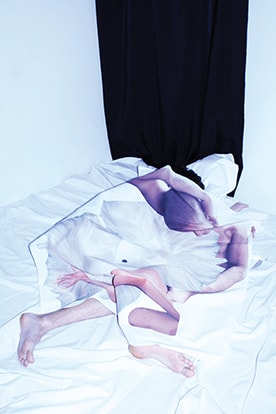
Marta Nowak
Rezygnacja jako zmiana własnej osobowości, zerwanie ze starymi nawykami. Głównym zamierzeniem było odejście od pokazania bohatera, zakrycie postaci fotografowanej. W każdym następnym zdjęciu redukuję element, który definiował kompozycję poprzedniego. Klimat zdjęć może się też trochę kojarzyć ze „zrezygnowaniem” postaci fotografowanej, ale to akurat efekt uboczny, chciałam odstąpić od żywej postaci jako bohatera zdjęć i wykonać próbę „zredukowania” kompozycji.

Bartosz Zalewski
Bez komentarza.

Gloria Faron
Tusz, stojący na biurku, jest metaforą materiału, którym zapisujemy historię naszego życia, widać też odbicie naczynia z wodą – jest to nawiązanie do Platońskiej jaskini, samo naczynie obrazuje nasze życie, które teraz jaśnieje, woda stopniowo zabarwia się błękitem, gdy kolor będzie już równomierny, czarka wypełni się, nastąpi nasz koniec. Jeżeli podjęliśmy decyzję o rezygnacji, czujemy, że wzbogaci nas to, że to był najlepszy wybór – podziwiamy więc następstwa tej decyzji, w spokoju zachwycamy się błękitem, który układając się w piękne kwieciste wzory zabarwia wodę w naszym naczyniu. Rozumiemy, że nasz czas jest skończony, a droga, którą podjęliśmy, wydaje nam się właściwa.

Karolina Polkowska
Często rezygnujemy z tego, jacy naprawdę jesteśmy, aby dopasować się do przyjętych w społeczeństwie standardów.
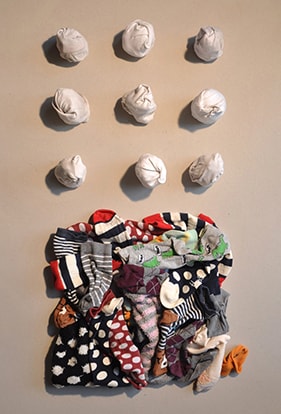
Kalina Golędzinowska
Bez komentarza.
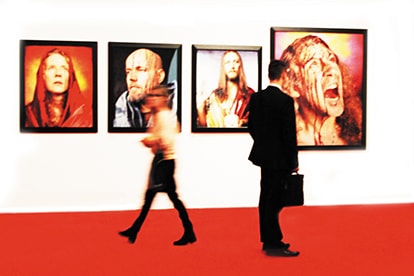
Zuzanna Pałkowska
Bez komentarza.
